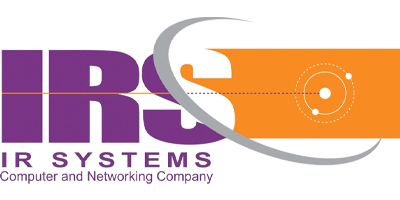What Are the Advantages of SAN Over NAS?
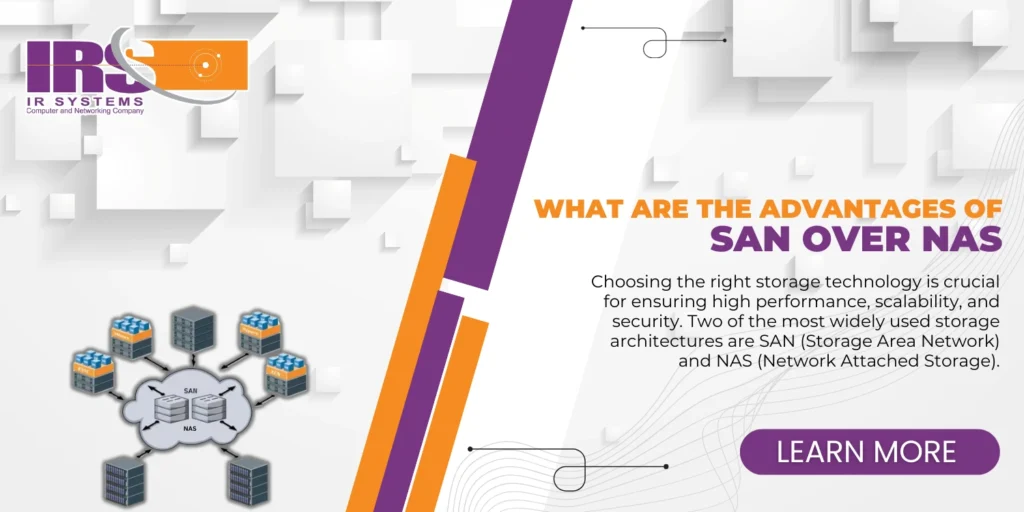
In today’s digital landscape, businesses generate vast amounts of data that require efficient and secure storage solutions. Choosing the right storage technology is crucial for ensuring high performance, scalability, and security. Two of the most widely used storage architectures are SAN (Storage Area Network) and NAS (Network Attached Storage). While both serve essential roles, SAN storage stands out as the preferred choice for enterprises and data-intensive applications. This article explores the advantages of SAN over NAS, highlighting why businesses, especially those looking for backup solutions in Lahore, should consider SAN for backup data storage and high-speed performance. Understanding SAN and NAS: Key Differences Before discussing the advantages of SAN storage, it is important to understand the fundamental differences between SAN and NAS. What Is SAN (Storage Area Network)? A Storage Area Network (SAN) is a dedicated high-speed network that connects storage devices directly to multiple servers, enabling block-level data access. Unlike traditional storage methods, SAN ensures low latency, high reliability, and superior performance by keeping storage traffic separate from standard network operations. Best For: Large enterprises, cloud computing, virtualization, databases, and applications requiring high-speed performance. Common Uses: Financial transactions, healthcare records, e-commerce platforms, and large-scale backup data storage solutions. What Is NAS (Network Attached Storage)? Network Attached Storage (NAS) is a file-based storage system connected to a shared network, allowing multiple users to access files over Ethernet. NAS functions like a centralized file server, making it ideal for simple file sharing and backups. Best For: Small businesses, home users, and organizations needing shared file access. Common Uses: Office document storage, media streaming, and small-scale backup solutions in Lahore. Why Choose SAN Over NAS? Key Advantages of SAN Storage 1. High-Speed Performance and Low Latency SAN storage provides exceptional performance compared to NAS, thanks to its high-speed architecture and block-level access. How SAN Achieves High Performance: Uses Fibre Channel (FC) or iSCSI for ultra-fast data transfers. Bypasses traditional network congestion, ensuring seamless operations. Delivers direct storage access to applications, reducing delays. Why This Matters: Businesses handling big data analytics, real-time transactions, and database management need high-speed access to critical information. SAN storage ensures minimal downtime and maximum efficiency. For example, financial institutions processing thousands of transactions per second cannot afford slow storage speeds. SAN ensures rapid data access, preventing transaction delays. 2. Seamless Scalability Without Performance Bottlenecks As businesses grow, their storage needs increase. SAN storage offers seamless expansion without affecting speed or efficiency. NAS Scalability Limitation: Adding more users or storage can slow down NAS performance due to increased network traffic. SAN Advantage: Easily expandable by integrating additional storage units. Supports thousands of users and massive data volumes without slowdowns. Best suited for organizations requiring continuous data access and storage expansion. 3. Superior Backup and Disaster Recovery Solutions Data loss can be devastating for businesses. SAN storage provides highly efficient backup and disaster recovery solutions to ensure business continuity. Advanced Backup Data Storage Features: Block-level backup enables faster and more efficient data recovery than NAS file-based backups. Snapshot technology allows quick restoration of previous data states. SAN supports real-time replication, ensuring up-to-date backup copies. Disaster Recovery Benefits: Geographically distributed replication ensures data availability in case of system failure. Ideal for backup solutions in Lahore, offering businesses a secure way to store and restore critical information. A large IT firm in Lahore, for example, can prevent data loss by using SAN for continuous replication and high-speed recovery, ensuring minimal downtime during unexpected failures. 4. Dedicated Storage Network for Maximum Efficiency Unlike NAS, which relies on a shared network, SAN operates on a separate high-speed network, ensuring better performance and reliability. Advantages of a Dedicated Storage Network: Eliminates network congestion and prevents slow data access. Provides uninterrupted storage access, even during peak usage hours. Reduces dependence on traditional Ethernet networks, enhancing efficiency. For example, an e-commerce company experiencing high traffic during a sale will benefit from SAN storage because it prevents slowdowns and ensures a seamless customer experience. 5. Enhanced Security and Data Protection Data security is a top priority for businesses handling sensitive information. SAN storage offers advanced security features that reduce the risk of unauthorized access or data breaches. Key Security Benefits of SAN Storage: Encryption capabilities protect data from cyber threats. Role-based access control (RBAC) restricts data access to authorized users only. Built-in redundancy ensures data integrity in case of hardware failures. Industries such as banking, government, and healthcare benefit from SAN security features, ensuring that sensitive data remains protected against cyberattacks and unauthorized access. 6. High Availability and Reliability Downtime can result in significant financial losses for businesses. SAN storage is designed to minimize downtime and ensure maximum reliability. Built-in Redundancy Features: Multiple storage controllers to prevent single points of failure. Automated failover mechanisms to ensure continuous operations. RAID configurations to protect against data loss due to drive failures. Many SAN solutions guarantee 99.999% uptime, making them ideal for mission-critical applications that require constant data access. 7. Optimized for Virtualization and Cloud Environments With the rise of virtualization and cloud computing, businesses need efficient storage solutions that can support multiple virtual machines. Why SAN is Best for Virtualization: Provides high-speed data access for virtual servers. Supports live migration of virtual machines without data transfer delays. Improves overall efficiency in cloud and hybrid environments. For organizations running VMware, Hyper-V, or Kubernetes, SAN storage ensures a smooth and scalable virtualization infrastructure. When Should You Choose SAN Over NAS? SAN storage is the best choice if your business requires: High-speed performance for databases, analytics, and enterprise applications. Scalable storage solutions without impacting speed. Secure backup solutions in Lahore for business continuity. Reliable backup data storage with advanced security features. High availability for mission-critical applications. Seamless virtualization support for cloud-based environments. If your organization deals with large-scale data storage, virtualization, or enterprise workloads, SAN storage is the ideal solution. Final Thoughts While NAS is useful for small businesses and basic file-sharing needs, SAN storage provides unmatched performance, security, scalability, and reliability, making it the preferred choice for enterprises. For businesses in
Secure and Scalable NAS Storage Solutions
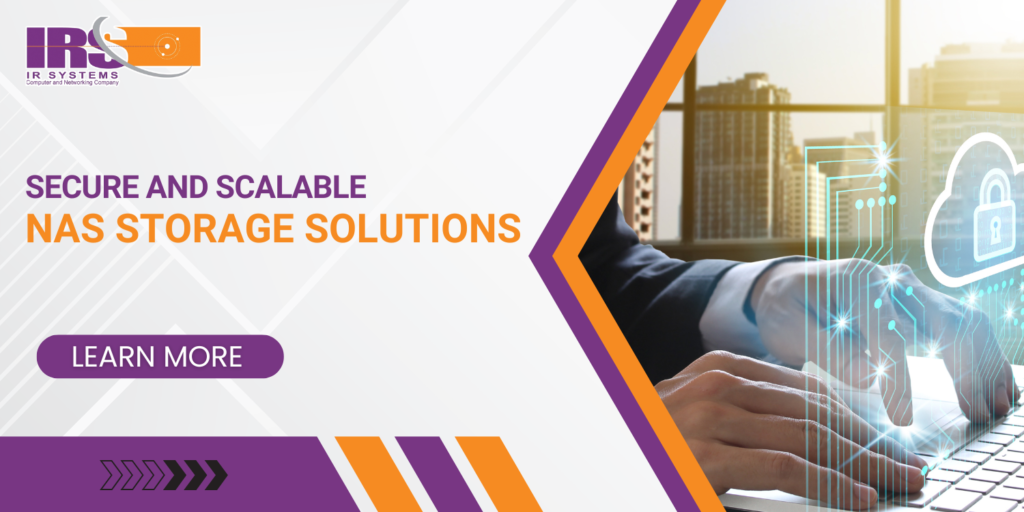
In today’s digital era, businesses rely heavily on efficient and secure data storage solutions to drive operations and safeguard valuable information. NAS Storage has emerged as a vital tool for companies aiming to streamline operations, ensure data security, and support continuous growth. Whether you’re a small business or a large enterprise, understanding the role and benefits of NAS (Network-Attached Storage) can transform the way you handle data. What is NAS Storage? NAS, or Network-Attached Storage, is a dedicated data storage device connected to a network that allows authorized users to store and retrieve data seamlessly. Unlike traditional storage solutions, NAS offers advanced features like: Centralized Data Management: Consolidates all your data in one place. High Scalability: Easily expandable as your storage needs grow. Enhanced Accessibility: Provides remote access to data anytime, anywhere. For businesses, NAS Storage provides a perfect solution to meet the increasing demands for data efficiency and security. Benefits of NAS Storage for Businesses 1. Seamless Backup Solutions One of the core advantages of NAS Storage is its capability to provide reliable Backup Solutions. It ensures your critical business data is protected against unforeseen circumstances such as hardware failures, cyber-attacks, or natural disasters. With automated backups and easy recovery options, NAS eliminates the risk of data loss. 2. Scalability to Meet Growing Needs As your business grows, so does your data. NAS Storage is designed to scale effortlessly, making it an ideal choice for enterprises of all sizes. You can add more storage capacity without disrupting existing workflows, ensuring uninterrupted operations. 3. Improved Collaboration and Efficiency NAS enables multiple users to access and share files simultaneously, fostering better collaboration within teams. With features like version control and secure file sharing, businesses can boost productivity and streamline operations. 4. Enhanced Data Security With cyber threats becoming increasingly prevalent, securing business data is non-negotiable. NAS Storage incorporates advanced security features like encryption, user access controls, and real-time monitoring to protect sensitive information. These features are invaluable for companies looking to safeguard their assets. How NAS Storage Supports Enterprise Data Security Centralized Data Management By consolidating all files in a centralized system, NAS simplifies data management while reducing the risk of data breaches. Administrators can monitor access, track changes, and ensure compliance with regulatory standards, contributing to robust enterprise data security. Backup and Disaster Recovery NAS devices are equipped with automated backup and disaster recovery features. Businesses can schedule regular backups to ensure data integrity and continuity, even during unexpected events. Integration with Existing Systems NAS Storage seamlessly integrates with existing IT infrastructure, allowing businesses to enhance data security without overhauling the IR SYSTEMS. Its compatibility with various software and hardware platforms ensures smooth operation. Why Choose NAS Storage? Businesses are increasingly turning to NAS solutions for their unmatched versatility and reliability. Here are some reasons why: Cost-Effective Solutions: NAS eliminates the need for multiple storage devices, reducing overall expenses. Flexibility: With remote access capabilities, employees can work from anywhere, enhancing operational flexibility. Customization: Tailored solutions cater to the specific needs of businesses across industries. At IR SYSTEMS, we offer state-of-the-art NAS Storage solutions designed to meet the unique requirements of businesses. Visit our website to learn more about how we can help secure your data and drive growth. NAS Storage vs. Traditional Storage Solutions Feature NAS Storage Traditional Storage Accessibility Remote and centralized Limited to local devices Scalability High Low Cost Cost-effective in the long run High maintenance costs Backup Capabilities Automated and efficient Manual and time-consuming Security Advanced encryption and control Basic protection mechanisms The Essential Guide to Enterprise Data Security and Continuous Business Growth Modern enterprises rely on robust data storage systems to secure sensitive information and support growth strategies. Here’s how NAS Storage aligns with these goals: Streamlined Workflows: With centralized data storage, employees can easily collaborate and share resources. Data Protection: Features like real-time backups and encryption safeguard critical business data. Cost Efficiency: Investing in scalable storage solutions reduces operational costs over time. Enhanced Decision-Making: Instant access to data enables informed business decisions, driving growth and success. FAQs About NAS Storage 1. What businesses benefit most from NAS Storage? NAS Storage is ideal for businesses of all sizes, especially those requiring secure, scalable, and cost-effective data management solutions. 2. How does NAS ensure data security? NAS devices offer features like encryption, user access controls, and real-time monitoring to protect sensitive data from cyber threats. 3. Can NAS Storage handle large-scale operations? Yes, NAS Storage is highly scalable and can accommodate growing data needs, making it suitable for large-scale operations. 4. Is NAS Storage cost-effective? Absolutely. By consolidating storage needs into one system, NAS reduces the need for multiple devices and lowers maintenance costs. 5. Where can you find reliable NAS Storage solutions? For reliable and advanced NAS Storage solutions. Final Thoughts: NAS Storage offers unparalleled advantages for businesses, from secure data management to enhanced collaboration and cost efficiency. By investing in this versatile solution, you can safeguard your business data, improve operational workflows, and support long-term growth. At IR SYSTEMS, we specialize in providing cutting-edge NAS Storage solutions tailored to meet your specific needs. Let us help you unlock the full potential of your business. For more information or assistance, don’t hesitate to Contact Us today and get started!
Advanced Backup Solutions – Enhance Data Security with NAS
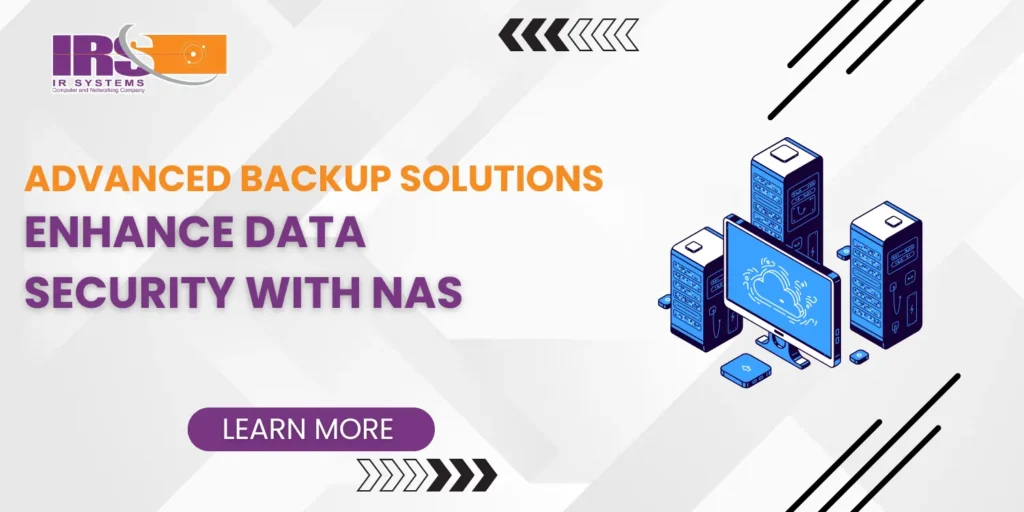
In today’s fast-paced digital world, data storage is crucial, and reliable backup solutions are more essential than ever. Backup storage solutions, like Network Attached Storage , play a pivotal role in ensuring the safety and accessibility of your data, whether for personal or business needs. A robust backup data storage protects against unexpected data loss from cyber threats, accidental deletions, or hardware failures, giving you peace of mind. Here’s what you need to know about the key types of backup storage solutions and why Network Attached Storage (NAS) is a popular choice for modern data management. Why Backup Storage Solutions are Essential Data loss can be devastating, especially when it involves sensitive or irreplaceable information. Backup storage solutions provide the safety net that every individual and organization needs to protect critical data. Here are a few of the main benefits: Protection Against Cyber Threats: With increasing cyber threats, a secure backup ensures data can be recovered if compromised. Preventing Data Loss from Hardware Failures: Hardware malfunctions can result in lost files; a reliable backup can help restore these without hassle. Access to Historical Data: Sometimes, having old versions of files or documents is necessary. Backup solutions retain versions for future access. Exploring Network Attached Storage (NAS) Network Attached Storage is becoming increasingly popular among local businesses and individuals. NAS offers a centralized platform to store, share, and back up data. Unlike traditional hard drives, NAS devices connect to your network, allowing multiple users to access files from different devices simultaneously. This storage solution is ideal for those looking for a streamlined way to manage and protect data. Top Advantages of Network Attached Storage (NAS) for Your Business Easy Accessibility: NAS allows users to access data from anywhere with an internet connection, making it an ideal solution for remote or hybrid workplaces. Data Security: Many NAS systems come with built-in security features, such as encryption and user authentication, to keep files safe. Scalability: NAS storage solutions are often scalable, allowing businesses to expand storage capacity as needed without overhauling the system. Types of Backup Storage Solutions A variety of backup storage solutions are available, each suited to different needs. Here are some of the most common options used by businesses and individuals today: 1. Cloud Backup Cloud storage is a popular choice because of its convenience and flexibility. By uploading files to a secure cloud server, users can access them from anywhere. Cloud backup solutions typically come with data encryption, providing an extra layer of security. However, they may require a monthly subscription and high-speed internet for optimal use. 2. External Hard Drives External hard drives remain a cost-effective backup solution, especially for personal use. Although these drives are easy to use and relatively affordable, they are vulnerable to physical damage and data loss if not handled carefully. 3. Network Attached Storage (NAS) NAS provides a dedicated storage device connected to a local network, enabling easy access for multiple users. With NAS, businesses can centralize their storage solutions, making it an efficient choice for team collaborations. Additionally, Network Attached Storage has advanced features like automated backups, ensuring data is continuously protected. Backup Solutions : What to Look For Choosing the right backup solutions depends on your data needs and security requirements. Here are some key features to consider when selecting a backup solution: Data Encryption: Ensuring your backup solution has data encryption can prevent unauthorized access. Automated Backups: An automated system minimizes the risk of human error and ensures data is consistently backed up. Storage Capacity: Consider the amount of data you need to store and select a solution with adequate capacity. How Backup Data Storage Works Backup data storage is a straightforward process but varies depending on the solution used. Here’s a basic breakdown of how it works: Identify Files for Backup: First, decide which files are essential for backup. This may include personal documents, business files, or digital media. Select a Backup Solution: Based on factors such as data size, accessibility needs, and budget, choose the best backup data storage, such as NAS, cloud, or external hard drive. Set Backup Frequency: Determine how often the backup should occur. Some solutions offer continuous backups, while others provide daily, weekly, or manual options. Perform Data Recovery Testing: Ensure the backup process works by periodically testing data recovery. This step confirms that data can be restored if needed. Boost Your Data Security: Key Advantages of Using NAS for Backup Network Attached Storage is a versatile and efficient solution for businesses and individuals looking to protect their data effectively. Here’s why Network Attached Storage stands out: Centralized Data Management: With NAS, data can be stored in one centralized location, simplifying organization and access. Continuous Backup Options: Many NAS devices allow continuous or scheduled backups, ensuring data is constantly protected. Remote Access: With internet connectivity, you can access your NAS from anywhere, making it suitable for remote teams. Backup Solutions for Small Businesses Small businesses often face the challenge of protecting their growing data without overextending their budget. Here are some backup strategies suitable for small businesses: NAS Devices: NAS offers small businesses the advantage of local network-based backup storage, providing accessible data without requiring high internet speeds. Cloud Storage with Local Backup: Combining cloud and local storage ensures redundancy, allowing businesses to recover data even if one backup fails. Data Encryption Services: Investing in backup solutions with encryption features adds another security layer, essential for businesses handling sensitive data. Frequently Asked Questions (FAQs) Q1: Why should you use Network Attached Storage ? Network Attached Storage offers a centralized, secure, and accessible solution for storing and sharing files across multiple devices, making it ideal for both home and business use . Q2: How often should you back up your data? The frequency depends on your date’s importance and how often it changes. Many users choose daily or weekly backups, while some prefer continuous backup options. Q3: What’s the difference between NAS and cloud storage? NAS provides local network storage accessible to multiple users,
Fast & Reliable Backup Solutions with NAS Storage
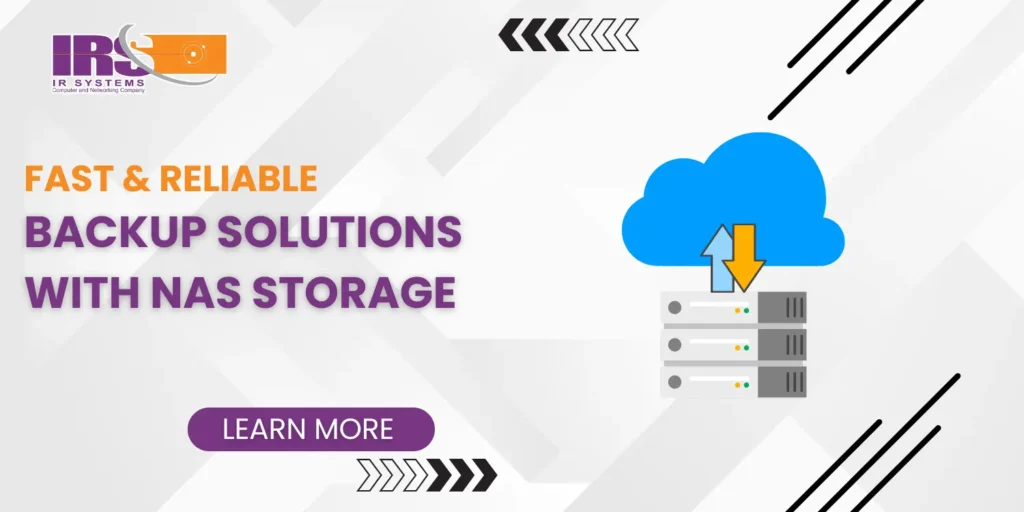
In a world where data is critical to operations, finding the fastest backup type is essential to keeping systems running smoothly. Whether you’re managing personal files or overseeing large-scale corporate data, quick and reliable backup solutions ensure your information is always safe and accessible. NAS storage offers a powerful solution with robust options for speed and security. This blog will explore different types of backup systems, explain the advantages of NAS storage, and highlight the importance of backup solutions . We’ll cover which types of backup are quickest and how they fit into various data needs, while also exploring the value of local services in enhancing data safety and efficiency. Understanding Backup Types: Which is the Fastest? To choose the fastest backup type, it’s essential to understand the primary options available: 1. Full Backup This backup type copies all selected data, providing the most complete backup. However, it can be time-consuming for large datasets, as every file is backed up each time. This method is best used sparingly, due to the considerable storage it requires. 2. Incremental Backup Incremental backups only save changes made since the last backup, making them significantly faster than full backups. They’re ideal for reducing backup time and storage, especially when frequent updates are necessary. 3. Differential Backup Similar to incremental backup, differential backups save changes since the last full backup. They are slightly slower than incremental backups but offer a balanced solution between speed and data restoration convenience. 4. Mirror Backup A mirror backup replicates your data in real-time, reflecting any changes or deletions instantly. While mirror backups are fast, they require constant management to prevent accidental data loss from unwanted changes. Among these, incremental backup generally offers the fastest speed and is preferred for frequent, low-impact updates. When implemented with NAS storage , incremental backups become a highly efficient option for businesses and individuals seeking rapid, secure data protection. Why Choose NAS Storage for Backup? NAS (Network-Attached Storage) is a versatile storage solution designed to provide centralized and accessible data storage over a network. NAS storage offers several key advantages: Speed and Accessibility: NAS systems enable quick access to files across multiple devices on the network, making it easy to back up data rapidly. This accessibility ensures files are always available and can be restored with minimal delay. Scalability: NAS devices are easy to expand as your storage needs grow, allowing you to add additional drives without complex configurations. This flexibility supports growing businesses and individuals with increasing data demands. Security: NAS devices offer advanced data encryption and user permissions, allowing secure data backup within a controlled environment. Security features are essential, especially when managing sensitive information in business settings. For businesses looking to optimize data management, NAS storage offers a powerful solution to centralize data and streamline backup processes. Exploring Backup Solutions: Every business’s growing demand for data storage solutions has led to the emergence of tailored backup solutions that cater to both individuals and businesses. Whether for personal use or corporate-level data management, these solutions provide the necessary support to protect and restore data quickly and effectively. Types of Backup Services Backup solutions offer a range of services: Cloud Backup Cloud-based solutions store data remotely, providing high accessibility and allowing users to retrieve data from any internet-enabled device. Cloud backup services are ideal for offsite data protection but may experience slower upload times based on internet speed. Local Backup For those who prefer offline backup solutions, local backup services use physical storage devices like external hard drives or NAS systems. Local backups ensure rapid access without internet dependency, making them a top choice for quick, onsite data recovery. Hybrid Backup Combining the best of cloud and local backup, hybrid solutions allow for data storage in both environments. This approach provides flexibility, enabling users to back up essential data onsite for speed while keeping less critical files on the cloud. Managed Backup Services Managed services provide expert oversight, handling the complete backup process, ensuring data integrity, and troubleshooting issues as they arise. These services are invaluable for businesses without dedicated IT staff to manage data backups in-house. Each of these options offers unique advantages depending on your specific requirements. For the fastest and most reliable solutions, backup solutions can provide customized services that fit individual and business needs. How NAS Storage Supports Fast and Reliable Backup Solutions Incorporating NAS storage into your backup strategy can significantly enhance speed and convenience. Here’s how: 1. Centralized Data Access With NAS storage, all data is stored in one accessible location, which reduces the time it takes to initiate backups across devices. This accessibility is especially beneficial for organizations with multiple users needing quick access to data. 2. Automatic Backup Scheduling NAS systems often come with scheduling capabilities, allowing backups to run automatically. This automation saves time, particularly with incremental backups, making it easy to maintain up-to-date copies without manual intervention. 3. Reduced Network Congestion By keeping backups localized within a network, NAS storage helps alleviate bandwidth constraints, ensuring that network resources remain free for other critical functions. For those seeking quick and efficient backup solutions, NAS storage is an excellent investment, offering not only speed but also the reliability needed for smooth data management. Benefits of Reliable Backup Solutions Opting for locally managed backup solutions offers several advantages: 1. Tailored Support Providers understand the unique needs of local businesses and individuals, offering tailored solutions and immediate assistance. 2. Improved Data Protection Local backup providers often offer enhanced security measures to protect data from threats specific to the region, ensuring information is safe from unauthorized access. 3. Cost-Effective Solutions Local services are often more affordable than international providers, making it easier for businesses to invest in reliable backup without excessive costs. 4. Faster Recovery Times By choosing backup solutions , you gain quick access to support and faster data recovery, ensuring minimum downtime for business operations. When combined with NAS storage , these backup solutions create a robust framework that prioritizes speed and reliability. FAQs What is
